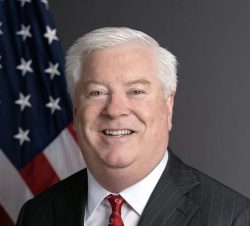November 11, 2021
“Feng sheng he li” in Chinese, or “fusei kakurei” in Japanese, is a classic Chinese idiom that literally means “wind sighing and crane calling.” It refers to troops who are so frightened, they bolt even at the sound of the wind or the cry of a crane. The debacle involving Afghanistan’s government forces in August, which was triggered by Washington’s decision to withdraw U.S. armed forces from the country, will be remembered as one of the worst cases of “fusei kakurei” in world history.
Then Afghanistan President Ashraf Ghani fled abroad as the Taliban Islamists were still on their way to the capital Kabul.
What did the Islamic Republic of Afghanistan, which came into being in 2004, ever mean to the people of Afghanistan, whom it ultimately abandoned in 2021? Despite calling itself an Islamic republic like Iran and Pakistan, the Afghan regime instantly vanished, unlike the two neighboring countries, where robust state institutions remain in place. The Islamic Republic of Afghanistan’s armed forces were abysmally rotten and corrupt. Ghani’s regime was said to have depended around the clock on about 20,000 privately contracted armed security personnel, mostly from Europe and the United States. Once Ghani and other Afghan leaders deserted their country, those private security personnel saw no reason to stay in Afghanistan.
In its 20-year-long involvement in Afghanistan since 2001, the United States spent $800 billion in direct combat costs and $85 billion training the Afghanistan government forces. However, Afghan troops were thought to be barely conscious of the meaning of the state and the people they were presumed to defend. Afghanistan has four main ethnic groups: Pashtun, Uzbek, Tajik and Hazara. Past interethnic efforts to reach a political consensus to share a sense of nationhood invariably ran aground. Units of the Afghan government forces mostly comprising members from a particular ethnic group blatantly refused to be deployed to areas that were dominated by other ethnic groups or had no ethnical connection with them. As such, it would have been impossible to create an integrated national defense force.
Ethnic groups are also tied to their counterparts in foreign countries. For example, Pashtuns in Afghanistan have strong relations with Pakistan, where people of the same ethnic group live. Likewise, people of the Uzbek ethnic group in Afghanistan feel a strong sense of affinity with the Central Asian republic of Uzbekistan, while members of the Tajik group feel close to Tajikistan. The Shiite Hazara community in Afghanistan always relies on Iran for protection.
As a result, the political dynamics of Afghanistan have been, and continue to be, linked to the national interests of Iran and other Middle Eastern countries. There is also pressure from Russia that comes from beyond Central Asia; the geopolitical ambitions of India, which is hostile to Pakistan; and the security situation of China — specifically, the Xinjiang Uygur Autonomous Region — which is connected to Afghanistan via the Wakhan Corridor, a narrow strip of Afghanistan land that runs east to west along the Pamir Mountains. Afghanistan can be said to be located in a very pivotal place where the trite term “geopolitical importance” can reclaim its genuine meaning.
Against this background, the withdrawal from Afghanistan of both U.S. and North Atlantic Treaty Organization troops naturally means the emergence of a political vacuum and an unstable crossroads where the interests of various groups intertwine with one another.
Who will restore stability?
What matters now is who can end the instability and restore order in Afghanistan to the extent that this place of strategic importance can be transformed into a parallelogram of stability encompassing the Middle East, South Asia, Central Asia and China. But the region’s history, going back to ancient times, shows such a situation cannot be easily realized.
Historically, few other countries have been exposed to more geopolitical complexity and instability than Afghanistan. Different political dynamics have always affected the geopolitical parallelogram of Afghanistan: east to west and north to south, from the age of Macedonian king Alexander the Great (356-323 B.C.), through the age of the Mughal Empire that was founded by Babur in the 16th century and existed until the 19th century.
From the 19th century on, the British and Russian empires engaged in the Great Game for supremacy in Central Asia and the Indian subcontinent. The focal point in the Anglo-Russian confrontation was Afghanistan, which both empires treated as a buffer state to avert direct clashes between the two powers.
What makes the situation in Afghanistan more complicated is that ordinary Afghan citizens had no notion of standing up against the Taliban to defend themselves. According to Amir Taheri, a commentator on Middle East affairs, Afghanistan has more than 18,000 villages comprising about 80% of the population that have never really been governed by anyone, enabling them to stay safe in their isolation. Opinion polls over the past two decades show Taliban support among the urban population hovering at just over 10%. Therefore, it is natural for the Afghanistan people to feel unenthusiastic about the Taliban’s return.
The Taliban have been criticized by the international community for restoring strict Islamic rule across Afghan society. Like the Taliban, not a few rulers over the course of history have believed that harsh governance would ensure quality politics.
Known for his conviction that hatred is one of the qualities of a ruler, Bozorgmehr, a premier of the Sasanian Empire in ancient Persia, believed that depriving people of a purpose in life and the opportunity for entertainment was an effective method of ruling. His remark that “a king ought to bear greater hatred [toward the people under his dominion] than [violent-tempered] camels” has much in common with the disposition of the Taliban, which prohibit people from enjoying entertainment that is otherwise good for resting their weary minds and limbs after working hard.
The Taliban’s new Interior Minister Sirajuddin Haqqani and the ruthless “Ministry for the Propagation of Virtue and the Prevention of Vice” have not only banned singing and dancing at weddings and music at hotels and restaurants and in cars, they have also prohibited posting photographs, training pigeons and playing with birds. Women are no longer allowed to walk on the streets in embroidered attire, among other garments. The Taliban do not endorse democratic principles such as gender equality and freedom of speech, assembly and association. But Haqqani and the like fail to understand that showing hatred toward the Afghan population all the time — just like Bozorgmehr or an ancient ruler making a camel-like outburst of emotions — could adversely result in aggravating the Afghan public’s antipathy to the current regime. In other words, Afghanistan is now being increasingly gripped by a reign of terror.
Assistance to Afghanistan
The international community began efforts to democratize Afghanistan soon after the U.S. military offensives that followed the concerted terrorist attacks on the United States in 2001 broke up the first Taliban regime. In January 2002, the Japanese government hosted an International Conference on Reconstruction Assistance to Afghanistan in Tokyo. In March of the same year, the Prime Minister’s Office dispatched a joint survey mission to Kabul in preparation for Japan’s assistance to the reconstruction of Afghanistan. I was one of the mission’s members. At the time, as the future of the country looked hopeful and positive, the Japanese mission subsequently presented the government with a series of priority assistance measures, including emergency assistance for resettling refugees and for ensuring women’s independence. Later on, an elected government was installed in Kabul and girls were given wider access to education. However, in the summer of 2021, the Taliban returned to Kabul, a development that reversed 20 years of effort to turn Afghanistan around.
So far, one country — China — has come to the help of the second Taliban regime, pledging in September to provide emergency assistance of $31 million. China has been keenly promoting the Belt and Road Initiative, and apparently wants to tap Afghanistan’s massive reserves of rare earths, uranium ore and lithium, among others. Moreover, China is uneasy about the possible penetration of the Islamic State Khorasan Province and other Afghanistan-based extremist branches of the Islamic State into the Xinjiang Uygur Autonomous Region.
The Taliban are not against making concessions to China. They seem to still be indifferent to the risks of becoming indebted to China. As a possible measure to satisfy the Chinese government, the Taliban may move to contain Uighur ethnic campaigns in Afghanistan that are similar to the East Turkistan Islamic Movement, which China accuses of being a separatist group entrenched in the Xinjiang Uygur Autonomous Region. In any case, if the Xinjiang Uygur issue develops into a flashpoint of conflict, it will become a new factor of instability for Afghanistan.
The importance of Afghanistan as an important geopolitical parallelogram linking Asia, the Middle East and Eurasia is not irrelevant to Japan. Encouraging the Taliban to act rationally will not only contribute to the restoration of stability in Afghanistan but also get Japan involved in rallying international calls for China to respect the autonomy of the Uighur ethnic group in its territory.
Top Articles in Editorial & Columns
-

Riku-Ryu Pair Wins Gold Medal: Their Strong Bond Leads to Major Comeback Victory
-

40 Million Foreign Visitors to Japan: Urgent Measures Should Be Implemented to Tackle Overtourism
-

China Provoked Takaichi into Risky Move of Dissolving House of Representatives, But It’s a Gamble She Just Might Win
-

University of Tokyo Professor Arrested: Serious Lack of Ethical Sense, Failure of Institutional Governance
-

Policy Measures on Foreign Nationals: How Should Stricter Regulations and Coexistence Be Balanced?
JN ACCESS RANKING
-

Japan PM Takaichi’s Cabinet Resigns en Masse
-

Japan Institute to Use Domestic Commercial Optical Lattice Clock to Set Japan Standard Time
-

Israeli Ambassador to Japan Speaks about Japan’s Role in the Reconstruction of Gaza
-

Man Infected with Measles Reportedly Dined at Restaurant in Tokyo Station
-

Videos Plagiarized, Reposted with False Subtitles Claiming ‘Ryukyu Belongs to China’; Anti-China False Information Also Posted in Japan























